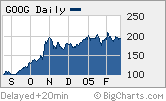 |
| Google has had a meteoric rise since its IPO and may have been due for a pullback. |
|
|
|
| �* based on2005 estimates and prices as of 2/24/05 | | �Source:��Thomson/First Call |
|
|
|
|
NEW YORK (CNN/Money) -
Online search stocks have defied gravity, with many investors apparently thinking that the Internet ad market would boom ad infinitum and that there would never be ugly pricing pressures to curtail growth.
On Thursday, these investors got a wake up call.
The Interactive Advertising Bureau and PricewaterhouseCoopers on Wednesday lowered their online ad sales figures for the third quarter of 2004 and indicated that fourth-quarter sales growth slowed more than expected.
That spooked investors as it raised fears that a slowdown may continue in the first half of 2005. RBC analyst Jordan Rohan downgraded search market leaders Google and Yahoo! on Thursday morning, citing unexpected weakness in paid-search pricing in the first quarter. Google (Research) and Yahoo! (Research) both sank about 5 percent on the news.
It didn't help maters that second-tier search-engine firm FindWhat.com (Research) gave guidance for the first quarter that was well below forecasts. The stock plunged more than 20 percent on Thursday morning.
Search is still sexy...
So are the good times finally over for online ad stocks? That might be a stretch.
Sure, growth has slowed. But it didn't exactly fall off a cliff. Online ad sales were up 28 percent in the third quarter from a year ago and 24 percent in the fourth quarter. The "problem" for investors is that this pales in comparison to the 40 percent annual growth rate in the first half of the year.
But the slowdown shouldn't be a huge shock. The third quarter in particular, which includes the summer months, is typically weaker for the search industry and both Yahoo! and Google said last year that they expected this trend to continue.
"The world hasn't ended. There is seasonality in online advertising. That's not surprising," said John Tinker, an analyst with ThinkEquity Partners.
That brings us to concerns about the first quarter and beyond. David Garrity, an analyst with Caris & Co., concedes that keyword pricing in the first quarter is probably going to soften a bit as some advertisers balk at what they deem high rates.
But he argues that this weakness won't last for long. In an age where more and more TV viewers are using TiVo and digital video recorders to zoom past commercials, the Internet has emerged as a more viable way to target consumers. So the online search companies have leverage.
"Traditional means of advertising aren't working and there's no other game in town. Where the consumer goes the advertiser must follow so this pushback is merely a temporary phenomenon," Garrity said.
What Thursday's dumping of search stocks really demonstrates is not a major deterioration in fundamentals but that any momentum stock trading at a ridiculously high multiple is subject to a correction at any hint of a slowdown in growth. Before Thursday's sell-off, Google and Yahoo! were trading at about 50 and 60 times 2005 earnings estimates respectively.
"The biggest issue for Yahoo! and Google is that they are expensive," said Tinker.
...but investors need to pay attention to valuation
So for savvy investors, the search stock shakeout could present some buying opportunities. Investors just need to be very selective and wary of valuations.
Ask Jeeves, for example, trades at just 15 times 2005 earnings estimates. Of course a company like Ask Jeeves (Research), which trails Google, Yahoo!, and Microsoft's MSN in search market share, should trade at some discount.
But profits are expected to increase 30 percent this year and 20 percent in 2006, so it appears that investors are underestimating Ask Jeeves' ability to take part in the industry's growth.
Investors also shouldn't limit themselves to search engine firms. Online advertising agencies like aQuantive (Research) and Digitas (Research) look compelling. Digitas trades at just 19 times 2005 earnings estimates, below its expected long-term growth rate of 20 percent.
aQuantive is more expensive, with a P/E of 42 times 2005 earnings projections. But analysts expect earnings to increase at a 28 percent clip for the next few years. Plus, the company reported fourth quarter results last week that crushed analysts' expectations and it also raised its revenue guidance for 2005.
ValueClick (Research), which helps companies distribute and track their online ads, also looks intriguing. Like aQuantive, the company reported healthy fourth quarter numbers last week and issued a bullish outlook for 2005. Shares trade at 31 times 2005 estimates and analysts expect profits to increase at a rate of 25 percent annually for the next few years.
Finally, Garrity points out that consolidation in the online ad sector is likely to continue as traditional media firms want to take part in the industry's growth as well.
To that end, The New York Times Co. (Research) recently announced it was buying About.com from Primedia (Research). Garrity thinks Viacom (Research) and News Corp (Research) could be potential acquirers and that increased M&A activity could lift the prices of all search-related firms.
Analysts quoted in this story do not personally own shares of the companies mentioned and their firms have no investment banking ties to the companies.
Sign up to receive the Tech Investor column by e-mail.
Plus, see more tech commentary and get the latest tech news.

|